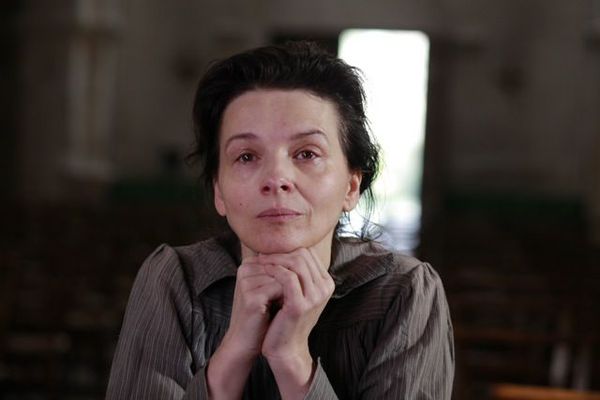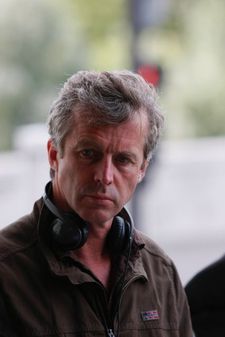 |
| Juliette Binoche as Camille Claudel |
He has a reputation as a doom-and-gloom minimalist but French director Bruno Dumont is much more than the sum of his parts. In his latest film, Camille Claudel, 1915, he focuses on the ill-fated artist and her internment in a mental asylum after her long affair with Auguste Rodin. Inspired by correspondence between the artist and her younger brother Paul (himself a famous poet and dramaturge), it is a gruelling and meditative study very much in line with the tone of Dumont’s work such as Outside Satan and Humanité. Here he uses disabled people as supporting cast members and for the first time he works with a major star, Juliette Binoche. In the autumn he lightens up with a cop comedy series with a difference for French television. Richard Mowe met Dumont earlier this year in Paris at the Unifrance Rendez-vous with French Cinema.
Richard Mowe: I believe that Juliette Binoche came asking to work with you rather than the other way round. Is that how the whole project started?
Bruno Dumont: I think she had mentioned on several occasions that she liked me as a director so I wasn’t that surprised when she called me. I was delighted and I looked around for a role that would suit her.
RM: How long did it take to find the role and how did you come up with Camille Claudel?
 |
| Bruno Dumont: Camille Claudel is quite close to Juliette Binoche |
BD: I tried to reflect on who Juliette Binoche was and the woman she had become today. Her age and her physique were taken in to consideration – and I knew she was a painter too. So I tried to think of something that would match her persona. I do not believe in character parts and creating a character from scratch. I prefer characters, who come close to the actor and I found that Camille Claudel is quite close to Juliette Binoche and therefore there was a coherence there that made it a good match.
RM: What was the reaction from Juliette when you came back with the idea?
BD: In fact in our discussions I had asked what she wanted to do. She said she would like to do a contemporary role, a woman of today, with her problems and her children. And I said emphatically ‘No.’ I said, 'let’s do Camille Claudel and in particular the part of her life when she is in an asylum.' That is a part which is not much documented or known about and certainly there had been no films on this particular period. She agreed right away, but I made two conditions in advance: no script and no make-up. And on that basis I started writing the screenplay right away.
RM: How long did it take to complete the script?
BD: I don’t know … I took about six or seven months to write it and of course I was writing it with her in mind. My starting point was the medical records and the diary so it wasn’t that long because all the material was there. I was respectful in my dialogues about what she wrote to the doctors and most of the events that take place are in the medical records. What was invented to a degree was the scene in the theatre but there were pictures of a small theatre stage in the asylum and patients participating in a play by Moliere so Camille could have imagined such a thing.
RM: You worked with real patients in an asylum. Was that a challenge?
BD: In a sense the whole ambiguity of cinema is there – what is true and what is fictitious. It depends on what type of mental illness they were suffering from exactly how much they understood. For the two women who play in the theatre, we did rehearse with them. But some of the other ones who were suffering from autism for example, there was no directing them. The young woman who was close to Camille did understand to a certain point about what was going on.
RM Was it difficult for Juliette Binoche to work with non-actors?
BD: No, quite the reverse – she was very keen to see how they would react and she approached it with a lot of humility because she was playing with women who had no idea who she was. That was an adventure for her and it gave her the opportunity to reconnect with very simple and spontaneous emotions. She asked for the chance to spend ten days in the asylum so she could start creating links with them and being able to call each other by their names as if they knew each other.
RM: Do you think that Juliette Binoche was very courageous in taking on this work?
BD: I think that actors are ready and willing to try many different kinds of things, but we [the directors] are the ones who avoid asking them. Binoche is a brave woman and she has a sense of adventure and she is willing to try new things, but I do believe that many actors also have that curiosity and we should have the courage to ask them.
RM: The film appears to fall naturally in to two distinct parts. What was your thinking?
BD: What the film tries to do is to span this wide range between speech at its smallest expression in the asylum where those women cannot speak to this amazing flamboyant level of speech by Camille’s brother Paul Claudel and his poetical expression. You have all the levels of the human mind. Claudel was a brilliant man while you have at the other end of the spectrum the people in the asylum. It is a kind of space trip in to the human condition.
RM: Were you concerned that another film had covered the life of Camille Claudel [Bruno Nuttyens 1988 version with Isabelle Adjani] even though you were dealing with a more precise moment?
BD: I knew that most viewers would probably have seen the previous movie and that gave me the possiblity of not mentioning it or referring to the previous part of Camille Claudel’s life … I took it for granted that they knew about her past life, they knew about Rodin and I did not need to go there. That was something really interesting for me because I did not have to educate the viewer as you might do with a child. I could just use this complicity with the viewer. I had seen the film when it first came out 20 years ago.
RM: Do you go and see a lot of cinema?
BD: I watch films regularly but my main interest is in the silent era and films from the first years of cinema. I like to see those first actors and that nourishes me. I asked Juliette to watch films by D W Griffiths and Louis Feuillade and there was also an interesting film by Sacha Guitry, which shows Rodin in his studio. I go a lot to the Cinematheque in Paris and, of course, there are lot of films on the internet without any copyright considerations. I have made some extraordinary discoveries. But I do prefer to see my silent films silent rather than the current trend to add contemporary scores to some of them.
RM: What’s next on the horizon?
BD: I have made a police comedy series for Arte called P'tit Quinquin (Little Quinquin), which starts broadcasting in September. It may not be what I usually do but I enjoyed it and I hope it makes people laugh. I am aware that I often do tragic films but there are moments on the set that are funny even if I do not put them on screen. I love tragedy, but I do love comedy as well. Even in Camille Claudel there is some humour in the scene on stage in the theatre. The TV series is in four parts and I worked with non-professional actors – one of the cops is a gardener, another is someone on the dole. I shot it in Calais and lots of local people are in the cast. There is one scene, which is very funny, where they are looking towards the British coast. It is quite close to traditional cop series, but the idea is to play around with the clichés of the genre. That is the beauty of a television series – you can have different characters coming in and out, whereas cinema is more academic. I worked for the first time in a digital format (Camille was on 35mm) and in the TV ratio but I was ready to accept the challenges of these constraints. I quite like the idea of going in to people’s living rooms for a change rather than them coming to the cinema.
Camille Claudel 1915 is now on selected release.





















